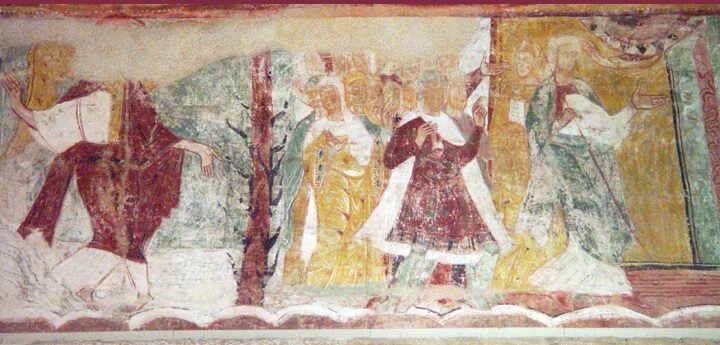Commentary on Daniel 3:1-29
Daniel 2–3 is one story with two episodes. In the first episode, Nebuchadnezzar dreams of a statue with a head of gold, below which follow layers of declining quality. Daniel interprets this dream as foretelling a succession of empires, each lower-quality than the one before, until the final empire has deteriorated to a mixture of “iron and clay.”
Daniel says that Nebuchadnezzar is the head of gold, the ruler of a gilded age. But the book’s readers find themselves living in the final age, a chaotic time ruled by corrupt kings. The statue in Nebuchadnezzar’s dream is destroyed by a divinely hewn stone that grows into a world mountain—a symbol of God’s kingdom ruled by the Messiah. This is episode one.
In episode two, Nebuchadnezzar makes a statue entirely of gold, top to bottom, as if to claim that his reign will last through all ages without deterioration and be invulnerable to the crushing rock of God’s reign. His demand that all people worship the symbol of his everlasting reign constitutes an act of profound impiety and arrogance. Shadrach, Meshach, and Abednego resist his imperious claims and remain faithful to God above all else, even above fear of a fiery execution.
Stories do not need to be factual to be true for moral and religious purposes. Like Jesus’ parables, the stories in Daniel 1–6 about brave and wise heroes of the faith are true, but it is unlikely they are factual. They were probably written just before the second century BCE, a time when Jews in the diaspora struggled to navigate political and cultural upheaval and religious conflict.
The book in its final form was composed in Palestine, where Jews were suffering persecution at the hands of the Seleucid Syrian tyrant Antiochus IV, who claimed to be theos epiphanos, “god manifest,” even minting a coin with this title inscribed. In 167 BCE he ravaged Jerusalem, desecrated the Jerusalem temple, and commanded the Jews to cease keeping Torah. Some who resisted were executed.
In Daniel, Nebuchadnezzar serves as a cipher for Antiochus and for rulers in every age who arrogantly set themselves against God’s people. In contrast, Daniel and his three friends represent wisdom, courage, and uncompromising obedience to God, qualities the audience is called to emulate as they navigate the empire’s demands and temptations in their own time.
The story of Shadrach, Meshach, and Abednego’s faithfulness and deliverance delightfully uses humor and exaggeration to mock the bloated ego of the king and the pretensions of empire. The narrator lampoons the empire by imitating ponderous imperial rhetoric—most obviously by listing repeatedly and at tedious length the officials called to bow down to the statue and the musical instruments used to prompt its worship. Reading the story aloud brings this out. The statue’s exaggerated size (90 feet tall by 9 feet wide!) subtly derides the pomposity of the king’s erection.
The unappeased king’s face-distorting fury, the pointless choices to have the strongest guards bind the three unresisting Hebrew men and to heat the furnace seven times beyond usual—so hot that the soldiers die at the mouth of the furnace (oops)—amusingly contrast the king’s desperation with the calm firmness of the three men’s resolve.
Finally, the reversal at the end of the story exceeds any reasonable expectation. A divine being appears in the furnace, the three men survive with not even a whiff of fire on them, and Nebuchadnezzar not only immediately confesses the greatness of the Hebrew God and honors the three men; he also declares a terrible fate for any who would blaspheme the Hebrew God.
It all provides a satisfying vindication of the Hebrews and an implicit humiliation of the king. The story is written to delight the oppressed and offer them the promise that in God’s economy, the last will be first and the first, last.
The likely intended audience of the story would naturally have identified with the three heroic Hebrew men, and readers today may too. But most who hear the story in our culture might well consider whether they are the three heroes—Jews whose religion and cultural identity are under attack—or whether they are Nebuchadnezzar—members of the empire who enjoy majority privileges. Few of us suffer the kind of oppression Daniel portrays. Most of us participate happily in the benefits of a powerful nation.
Navigating the story in a sermon with both these possible points of identification in mind is challenging. We can imagine times when we might be called to resist compromising our faith in God, and we see ourselves standing firm, as the three heroes did. That’s the inviting point of connection in the story. It is less inviting to be reminded that the privileges that arise from our participation in the empire come at a price. Can we bow to symbols erected to celebrate the power and glory of our nation without compromising our confession that the kingdom, the power, and the glory belong to God alone?
As Christians, we pray that God’s reign will come as fully on earth as it is in heaven. But in the meantime, we are caught between competing reigns. Like Shadrach, Meshach, and Abednego, we must choose between allegiance to God’s rule and compliance with the empire’s demand that we bow down to its values. We are called to “come out” of Babylon (Revelation 18:4), even if it means we forfeit the empire’s protections and privileges or suffer its reprisals.
Not all stories of faithful resistance have happy endings. The books of 1 and 2 Maccabees, written around the same time as Daniel, relate the martyrdom of many faithful Jews during Antiochus’ reign of terror. We do not know, any more than did the three Hebrew men, if there will be an angel in the fire for us. But like them, we are called to say, “If our God whom we serve is able to deliver us …, let him deliver us. But if not, be it known to you, O king, that we will not serve your gods and we will not worship the golden statue that you have set up.”


March 30, 2024